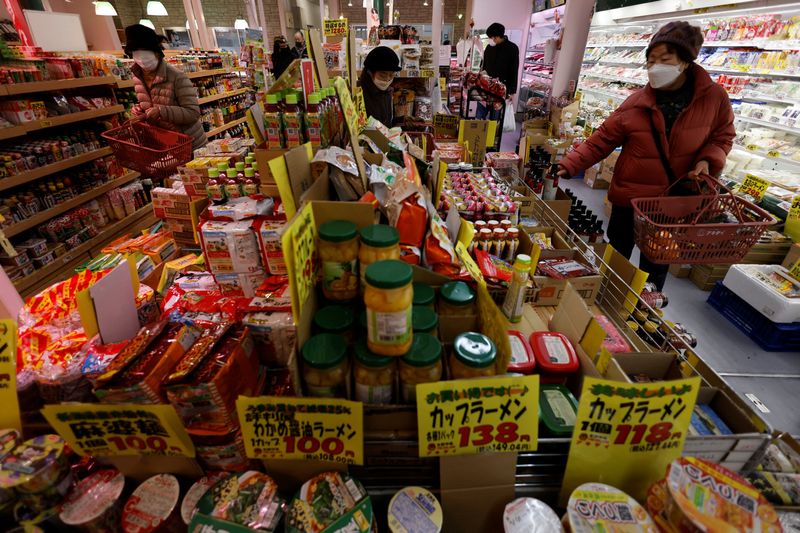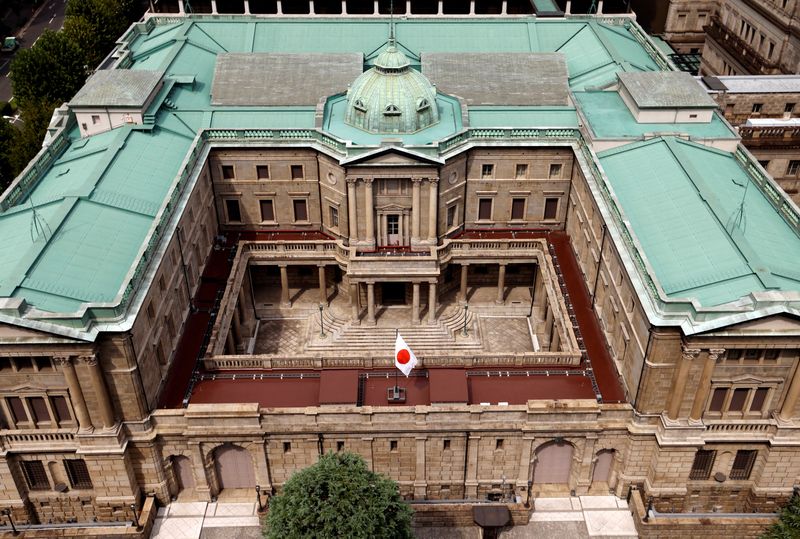By Leika Kihara and Tetsushi Kajimoto
TOKYO (Reuters) -The Bank of Japan further loosened its grip on long-term interest rates by tweaking its bond yield control policy again on Tuesday, taking another small step towards dismantling its controversial monetary stimulus of the past decade.
While it kept ultra-low interest rates steady, the BOJ watered down its 1% cap on the 10-year bond yield which it set just three months ago to allow long-term borrowing costs to rise more.
The bank's nine-member board also revised up its price forecasts to project inflation will well exceed its 2% target this year and next, underscoring a growing conviction that conditions for phasing out its super-loose policy are falling into place.
But the yen tumbled against the dollar after the decision as traders focused on the BOJ's dovish pledge to "patiently" maintain accommodative policy and forecast inflation would drop back below 2% in 2025.
"We still haven't seen enough evidence to feel confident that trend inflation will (sustainably hit 2%)," BOJ Governor Kazuo Ueda told a press briefing after the decision. "As such, we don't see a big risk of being behind the curve."
As widely expected, the BOJ maintained its -0.1% target for short-term interest rates and that for the 10-year government bond yield around 0% set under yield curve control (YCC).
But it re-defined 1% on the 10-year yield as a loose "upper bound" rather than a rigid cap, and removed a pledge to defend the level with offers to buy unlimited amount of bonds.
The BOJ had effectively capped the benchmark yield at 0.5% until July, when it raised the de-facto ceiling to 1% to iron out market distortions caused by years of huge bond buying.
The decision highlights how rising global bond yields and persistent inflation are making it increasingly difficult for the BOJ to maintain its controversial bond yield control.
The BOJ stuck to its view of a modest recovery in the world's third-largest economy, though it warned of "extremely high" uncertainty on the outlook due to risks such as the fallout from slowing global demand.
Ueda said the BOJ will no longer forcefully cap long-term rates at 1% but step in to avoid the 10-year yield from sharply moving above that level, adding that the tweak was aimed at making YCC more flexible.
"Through all the linguistic contortions, the fact is that they are dismantling YCC," said Tom Nash, portfolio manager at UBS Asset Management in Sydney, who is positioned for a rise in Japanese yields.
"A yield cap isn't a yield cap if you change it every time the market gets close."
The 10-year Japanese government bond (JGB) yield rose 6 basis points to its highest levels in a decade around 0.95% after BOJ's review. Yields had risen well ahead of the BOJ announcement as market speculation swirled of an imminent policy tweak.
BALANCING ACT
While other major central banks have aggressively raised interest rates over the past year to curb inflation, the BOJ's has been a dovish outlier. But that stance has been rattled by persistent cost pressures that have kept Japan's inflation above its 2% target for more than a year.
Under criticism that its heavy defence of the cap is causing market distortions and an unwelcome currency fall, the BOJ hiked its de-facto ceiling for the yield to 1% from 0.5% in July.
Since then, rising global bond yields have put the BOJ in a tight spot with the 10-year JGB yield creeping near the 1% cap.
As inflationary pressure broadens, nearly two-thirds of economists polled by Reuters before Tuesday's decision expected the BOJ to end negative rates next year.
Ueda signalled that the BOJ was in no rush to end YCC or negative interest rates, even though Japan was making some progress toward sustainably achieving 2% inflation.
"The main driver behind the recent overshoot is prolonged cost-push inflation," he said, referring to jumps in import prices for oil and other items.
"The key is whether inflation will push up wages, as we've seen happen this year repeatedly," Ueda said, adding that next year's spring wage talks were among key factors he will scrutinise.
He also offered few clues on the order in which the central bank could dismantle YCC and negative rates, saying the decision will depend on economic and price developments at the time.
"Our basic stance is to maintain both YCC and negative rates until sustained achievement of 2% inflation comes into sight," he said.
While Ueda has continued the dovish rhetoric of his predecessor who retired in April, the weak yen and other factors have prompted the BOJ to water down the stimulus of the Haruhiko Kuroda era, including YCC.
Many analysts expect the dismantling process to continue, albeit slowly.

"With today's decision, the BOJ effectively ditched YCC," said Ryutaro Kono, chief Japan economist at BNP Paribas (EPA:BNPP).
"The risk of the BOJ pushing forward the timing of policy normalisation is heightening," he said, pointing to the possibility of an end to negative rates and YCC in January.
